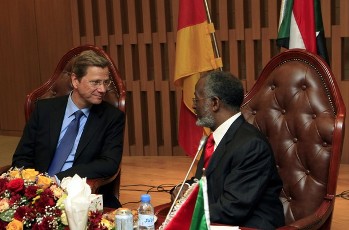Germany mulls relief of Sudan’s debt
17 October 2011 (KHARTOUM) – Germany has been engaged in talks with Sudan regarding debt relief, Berlin’s deputy envoy to Khartoum revealed, saying that these communications are expected to yield results by early 2010.

Lehne said that Germany had offered Sudan to pay its debts in the form of development projects rather than paying them in cash to his country.
“Sudan actually sent proposals [on development projects] that we are currently considering. Procedures to write off [Sudan’s debt] on the basis of these proposals will begin early next year,” the German diplomat was quoted.
Sudan’s external debt stood roughly at 36.8 billion USD at the end of 2010, of which $15 billion USD is the original amount borrowed while 20.3 percent of that amount accounts for interest in arrears and late payment penalties.
The total debt owed by Sudan to members of the Paris Club, including Germany, stands at $11.2 billion while $13.3 is owed to non-members of Paris Club, both categories account for 68 percent of the obligations.
Multilateral creditors, including the International Monetary Fund and World Bank, account for 15 percent of Sudan’s obligation.
In late September, Sudan’s foreign minister Ali Karti was in Paris where he warned that his country’s economy faces collapse unless the international community steps in and provide assistance in the field of debt relief.
Karti told reporters in the French capital city that debt servicing “incurs more than $1 billion annually,” adding that the world could not simply stand back and watch as his country faces “really serious” economic woes.
The World Bank said that Khartoum would need to introduce wide economic reforms to qualify for relief of multilateral debt.
Sudan’s economic situation is at a critical stage following the country’s loss of 75 percent of the revenues of 500,000 barrels of oil it used to produce daily after South Sudan, which contains most of the oil field, seceded in July.
Legal experts say that until a deal is reached between Sudan and South Sudan on splitting up national debt, Khartoum is liable for making the necessary payments.
(ST)
